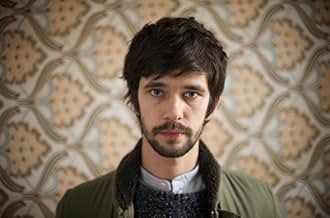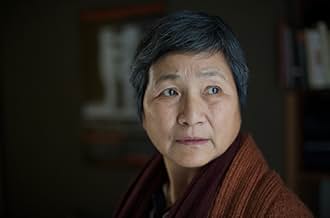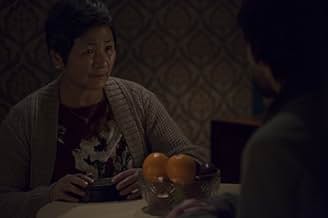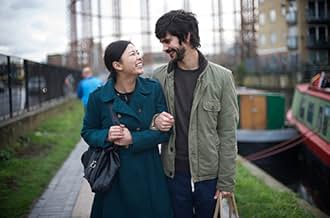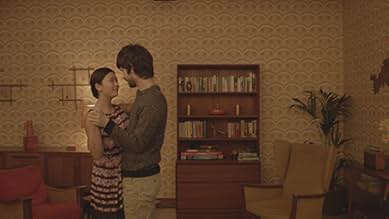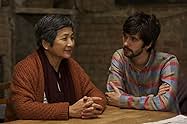Un jeune homme d'origine chinoise et cambodgienne meurt, laissant derrière lui sa mère isolée et son amant, qui le pleurent tous les deux, mais ne parlent pas la même langue.Un jeune homme d'origine chinoise et cambodgienne meurt, laissant derrière lui sa mère isolée et son amant, qui le pleurent tous les deux, mais ne parlent pas la même langue.Un jeune homme d'origine chinoise et cambodgienne meurt, laissant derrière lui sa mère isolée et son amant, qui le pleurent tous les deux, mais ne parlent pas la même langue.
- Réalisation
- Scénario
- Casting principal
- Nomination aux 1 BAFTA Award
- 4 victoires et 7 nominations au total
- Junn
- (as Cheng Pei Pei)
- Vann
- (as Naomi Christie)
- Waiter
- (non crédité)
- Cafe customer
- (non crédité)
- Elderly Resident
- (non crédité)
- Café Customer
- (non crédité)
Avis à la une
When Richard enters the fold initially he seems like a stranger, at least as far as Junn is concerned, and to make it harder, he can't communicate with Junn as she can speak 8 different dialects, but refuses to learn English despite living in the UK. Despite their differences, despite the overwhelming obstacles to hurdle, Richard is not intending on giving up trying to talk to his partner's mother. They share the same pain, but Junn has no idea of this. Since Junn doesn't know about the same-sex relationship her son was having, Richard's job becomes at least twice as tough, as he has to act as Kai's 'best friend', trying to connect with Junn that they both are sharing the same misery, the same loneliness and sense of loss after losing a loved one.
Along the way Junn meets a gentleman who is also a resident at the home. Playing an amusingly dry old codger, Peter Bowles as Alan is smitten by Junn, yet they have no way of truly communicating. Richard rectifies this by hiring a translator, which helps both Alan and Richard as it opens up a dialog between the different parties, for better or worse. Richard continues to go to endless lengths to try and communicate and help Junn overcome her son's death, as unwilling as she seems, as well as trying to help negotiate the problems Junn and Alan are having; it seems the possibility of a relationship with Alan may be slim. And so the story goes, moving from this premise into emotional territory where each character's decision is not easy, and someone as stubborn as Junn makes life difficult for Richard and the translator he has to help smooth the process Which doesn't go as smoothly as planned.
This film is extremely depressing at points and heartwarming at others. It is nice to see a film with a real heart without dipping into overly sentimental trite. The true unforgettable message that this film gave me was how it illustrated how culture can truly alienate us; from loved ones, from people who want to help. But at the same time, it highlights elements of the human condition that transcend culture, such as family, or music. I didn't think I'd enjoy this as much as I did, it isn't my type of film really. But I really liked it. Probably also because I have seen how truly heart-breaking it is to make that decision to put a parent/grandparent in a home really is. It ain't pretty.
8/10 - If you aren't looking for action, and are interested in watching a more thought-provoking movie that really will pull at your emotions, check this one out. The absurdly low budget is not noticeable at all, especially given the quality of the production, from the perfect sequence of scenes, to the subtle but interesting photography work and the minimal but effective soundtrack.
This isn't a film that I will revisit immediately, unlike many others than have been released this year. But I know that a time will come where I suddenly will have to put this on. It is a powerful, emotional film that subtly comments on the differences of cultures and/or language, the stigma that is still attached to same-sex couples, especially among older, more 'traditional' people, but most importantly, a few key scenes show us that differences in culture, in language, in beliefs, can be transcended, and no matter what the barriers between communication may be, humanity can prevail.
It is not impossible to share true, meaningful moments with someone who cannot speak a word of your language. This film excels at showing this, linking us all as human, no matter our colour, our culture or our beliefs.
It was easy to forget that you were watching actors. The performances were that good and very moving. It was very much like a French film.
It was interesting how much back-story was left out and yet it still worked. I asked myself a few questions because I wanted to know more. (Perhaps I felt I could help.) Where were we? (North-east London/Essex?) How long had she lived in England by depending on her husband and son for all communication with the outside world? What did people do for a living? Where did the translator come from and was she being paid? Without her son would she at last break out into the world? However I realised the back-story didn't matter. It told you all you needed to know. The nub was all that mattered: an insight into communication, memory and grief. Some things have to be said and some things are perhaps best left unsaid. The characters kept asking the translator not to translate after they had said something because they had time to see the effect it would have, (something that does not happen with a common language) but even the translator could not help but get involved.
You could speculate on a happier outcome but the final scene where she drifted back to the last meeting with her son perhaps indicated it would be a while yet before she could move on.
Very, very good.
She relies on Kai's attentions and affections, but her isolation becomes utterly complete with his unfortunate death. Junn knew that Kai lived in a house with Richard (Ben Wishaw), but Kai hadn't told her they were together as a couple. Grief-stricken himself, Richard feels duty-bound to help Junn, but they don't even share a common language let alone know much about each other.
Alan (Peter Bowles) resides at the home too and starts an unusual relationship with Junn where they talk to each other in their own languages, not really knowing what on earth the other is thinking or talking about apart from physical gestures. Richard tries to help this sweet pairing by hiring a translator in Vann (Naomi Christie), so that they can communicate with each other. Its a way in for Richard to get closer to Junn, who has her own reasons for disliking him.
'Lilting' is the debut from writer-director Hong Khaou, who shines a light on contrasting cultures in the capital. Grief is foremost in the minds of all concerned, Wishaw is wonderful as the achingly suppressed Richard, who gradually releases his grief the more he gets to know Junn, showing her just how much he loved Kai. Pei Pei plays the stoic mother perfectly, you can see the isolation, love and grief in her eyes.
In light of the subject matter, the overall mood of 'Lilting' is quite forgiving. Junn and Alan provide the most endearing moments as well as some awkwardly comical scenes especially when they confess their bad habits to each other. Dealing with such weighty issues as love, memory, language and mourning, Khaou has directed an assured and thoughtful film full of subtle releases and deeply felt emotions.
However Hong Khaou's film looks at the difficulties of communication at a much deeper level than the purely linguistic. He invites us to reflect on the wisdom of Kai's decision to put his mother in sheltered accommodation, whose dingy décor is designed to make elderly people 'feel better.' Despite Richard's basic kindness and his protestations of endless love for Kai, we wonder whether he actually understand what either Kai or Junn actually think. Maybe it's not really necessary to hire a translator: communication between individuals can take place at a subliminal level. Vann does her best to act as an intermediary between Junn and Richard, or Junn and Alan, but it's clear that her role is a peripheral one in the drama of familial relationships across cultures.
Shot in deliberately dark colors, LILTING depicts a world whose protagonists live in perpetual isolation, both literal as well as psychological. Junn's sheltered accommodation is both dark and prison-like; her fellow-residents seldom communicate except in clichés (Alan included). Richard's apartment is full of long, brick-lined passages; his kitchen is full of dirty cutlery, suggesting a fundamental inability to cope with life.
Our relationship with the two central protagonists is a complex one. Whishaw tries his best to render Richard a sympathetic character, but the more effort he makes to try and bridge the cultural differences separating himself from Junn, the more frustrated he becomes. His final outburst, where he accuses Junn of failing to "assimilate" to contemporary British cultures, is a classic colonialist statement, leaving us to reflect on why he himself did not do more to adapt himself to her mores. By contrast Junn remains both silent and serene; her final soliloquy reveals her determination to continue her existence, despite the prospect of future loneliness. She does not need to "assimilate"; she has found her own way to negotiate the culture she inhabits.
Modestly budgeted yet memorably staged by a director with an obvious affinity for the material, LILTING is an absorbing cinematic experience.
Le saviez-vous
- AnecdotesFilmed in 3 weeks.
- GaffesAt the scene when Ben Whishaw and Andrew Leung were on bed, Ben says "You're really gonna do that?", but his lips don't move.
- Citations
Junn: Through plenty of crying, I've learnt to be content that I won't always be happy, secure in my loneliness, hopeful that I will be able to cope. Every year on Christmas Day I get very lonely. An incredible feeling of solitude. On this day, everything has stood still, even the trees have stopped rustling, but I'm still moving, I want to move, but I have nothing to move to, and nowhere to go. The scars beneath my skin suddenly surface and I get scared. Scared of being alone.
- ConnexionsFeatured in Lilting: Deleted Scene (2014)
- Bandes originalesYe Lai Xiang
Performed by Xiang Lan Li
Meilleurs choix
- How long is Lilting?Alimenté par Alexa
Détails
- Date de sortie
- Pays d’origine
- Site officiel
- Langues
- Aussi connu sous le nom de
- Lilting
- Lieux de tournage
- Sociétés de production
- Voir plus de crédits d'entreprise sur IMDbPro
Box-office
- Montant brut aux États-Unis et au Canada
- 27 054 $US
- Week-end de sortie aux États-Unis et au Canada
- 1 567 $US
- 28 sept. 2014
- Montant brut mondial
- 247 377 $US
- Durée1 heure 23 minutes
- Couleur
- Rapport de forme
- 2.35 : 1
Contribuer à cette page








